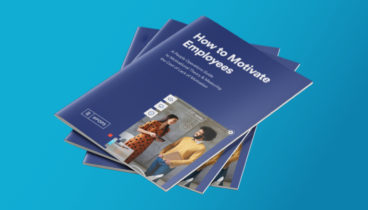Employers and employees alike are feeling inflation anxiety. Here’s how your organizations can combat it in the workplace.

With the rising inflation reaching an 8.5% increase since last year, employers and their workers are facing enormous financial stress. According to the American Psychological Association, 87% of Americans are stressed about higher prices for everyday goods, including fuel, food, and other essential items.
But the financial anxiety extends to employers as well. Depending on the industry, not only have the cost of manufacturing and logistics increased but offering higher wages may also further stoke rising prices — thus potentially continuing the inflationary spiral.
On the flip side, companies that refuse to offer higher wages run the risk of worsening their labor shortage, as employees look for employment that can cover the cost of living. But there are steps that organizations can take to help themselves and their employees.
First, what is inflation anxiety?
Inflation anxiety is defined as stress about rapidly rising prices, usually accompanied by stagnant wage growth.
Inflation anxiety is defined as stress about rapidly rising prices, usually accompanied by stagnant wage growth. But inflation anxiety for employers adds another layer of complexity.
Employers have to reshuffle their budget to ensure they have funds for core operations and the ability to meet payroll — even before a pay increase is considered. With the pandemic lockdowns in recent memory, employers have further financial stress of unpredictable cash flow.
Furthermore, the Federal Reserve’s monetary policy is advocating for higher interest rates. While this policy usually tempers inflation, it can also create a higher cost of credit. This means that companies and individuals dependent on a credit line might struggle if they can’t stabilize their cash flow.
What can employers do to combat inflation in their organization?
Employers have several hurdles when it comes to combating inflation within their business. Some common issues include:
- Potential lack of access to credit
- Worker retention
- Increased cost of supplies
- Drop in consumer demand
- Financial anxiety among staff
To reduce the effect of rising inflation on their business, employers have a few options. Employee benefits packages are often one of the first items on the list for revaluation. After all, it’s better to trim benefits in the short-term than face potential job loss, especially with the current labor market.
Healthcare costs are particularly tricky. Many employers are looking not only to decrease healthcare spending but perhaps shift some of that money back to employees. Decreasing spending on superfluous or high-premium plans without significantly reducing coverage and putting money back in employees’ pockets can help reduce the financial stress.
At the same time, there are in-office expenses than can be cut to reallocate funds to key operations. Keeping remote work an option and limiting rent space, for example, can reduce the budget considerably. And without the commute, employees also save on fuel.
It may also be worth it to invest in automated tools throughout the organization. Automation can help reduce the workload for short-staffed departments, while simultaneously making it possible to save time, money, and resources for other tasks. In fact, leveraging automated solutions in place of manual processes can save you up to 75% in certain departments. This is due to the fact that automation reduces errors, as well as time and resources spent on certain tasks.
Hire freelancers
Another way to reduce inflationary pressure on your budget is to hire independent contractors rather than full-time employees, especially for short-term projects. An independent contractor may often appear more expensive to hire, however, they do not partake in benefits packages, which can save funds on the back-end. This solution can be especially helpful if you are uncertain whether you need to fill certain positions, or if you estimate finding the right candidate will take longer than normal due to the market.
What’s your biggest 2022 HR challenge that you’d like to resolve
Answer to see the results
How to help your employees handle inflation
On the employee side, workers are anxious about whether or not they will be able to make ends meet. In the short-term, there are a few things employers can do to help relieve workers from financial stress:
- Employee discounts. Creating an employee discount program can help workers regain some of their purchasing power without becoming a burden on the company. These initiatives can help employees save more when they buy from local restaurants, big-box stores, groceries, and even theme parks.
- Special bonuses. There are many bonus types that can improve employee cash flow. Tuition reimbursement, elder care, child care, pet insurance, fertility, and home downpayment bonuses are just some examples, but they pack a punch. These bonuses typically go to employees who have been with the company for about a year and meet minimum qualifications.
- Financial planning seminars. Giving employees a one-on-one consultation with a financial advisor can help them navigate the uncertain economy. After all, if they have a plan for managing inflation, they are less likely to feel stressed about its effects.
- Mental health support. You may also want to invest in additional mental health support. This can take the form of teletherapy or meditation app subscriptions. Providing a safe space for employees to learn to manage their anxiety is a small way to show you care.
Inflation and the Great Resignation
One of the employers’ primary concerns related to inflation is the labor shortage. In an uncertain labor market, more and more employees are leaving in search of a pay increase. And with the inflationary pressure facilitating rising costs, this will likely continue.
This means that employers need to consider their compensation packages carefully. Many are choosing to offer raises. But while salaries increased by 3% on average in 2021, these higher wages aren’t anywhere close to overcoming inflation.
while salaries increased by 3% on average in 2021, these higher wages aren’t anywhere close to overcoming inflation.
Even if a business can’t currently offer higher wages, there are ways to support workers through finely-tuned employee benefits packages. Some examples include:
- Provide financial planning services
- Access to fertility or other supplemental healthcare benefits
- Increase matching for 401(k) contributions
- Offer student loan repayment plans
- Give generous paid time off
- Invest in internal professional development programs
- Promote work-from-home options
- Provide access to mental health services and benefits
Health insurance and the cost of healthcare will continue to be the number one benefit consideration for employees, with 88% of Americans open to taking more comprehensive healthcare benefits over higher pay. But another 44% want to work from home full-time, which can save companies and their workers on office space, materials, commuter discounts, and childcare benefits.
Ultimately, it may be best to have a cafeteria-esque benefits package that allows a certain amount to each worker and allows them to choose which employee benefits they want most. This gives the company a fixed budget and flexibility while employees have a personalized, relevant benefits package they will take advantage of.
Reduce clutter and costs in HR
Navigating the uncertain economy is no easy feat. Between the war in Russia, rising interest rates, an ongoing pandemic, and inflation, it’s no wonder that both employers and employees have financial anxiety. However, it’s possible to navigate uncertain waters through planning and regularly evaluating your operations and budget.
Going digital is perhaps the second best thing you can do for cost savings and reducing the evergrowing workload. And one of the departments that benefit most from digitization is HR. Learn how your business can not just survive but thrive with digitized HR in our recent Go Digital guide.







